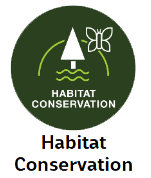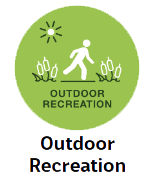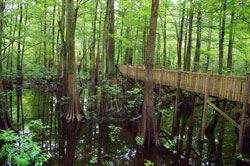CONTRIBUTE
 |
 |
 |
 |
How You Can Help
Please consider becoming part of our work and success. It’s easy to become member online and support our work. Contributions from individuals, corporations and foundations are essential to our success. Learn about all the ways you can support our conservation projects in Mississippi. We have a lot to show for our efforts over the last 25 years. We have protected, restored, or enhanced more than 650,000 acres of land and water across the state. Read more in our publications. Great work lies ahead. Together, we can make Mississippi a better place to live, work and raise a family.
Make A Donation
Wildlife Mississippi Puts Your $$$ to Work
Habitat Conservation
Conservation Initiatives

Wildlife Mississippi has had great success protecting, restoring, and enhancing lands and waters across the state in the last 25 years. Much of its conservation work occurs on private lands and on land the organization owns.
Wildlife Mississippi has protected, restored, or enhanced more than 650,000 acres since it was formed.
Wildlife Mississippi provides ecologically sound, cost-effective conservation that enhances wildlife, improves water quality, increases outdoor recreation opportunities, and enriches communities.
Mitigation Bank
Wildlife Mississippi is one of the largest owners of wetland mitigation lands in the United States. Its wetland and stream mitigation efforts are known collectively as the Strategic Wetland Acquisition and Management Program, or Mississippi SWAMP.
We locate our mitigation projects in areas with a significant ecological need, and we identify potential mitigation lands in areas that will provide the greatest service to future economic development.
In addition, our banks provide comparatively low cost mitigation credits, allowing the state to have a competitive edge when trying to attract businesses and industries. Our mitigation program has proven valuable in attracting major employers to the state, including Nissan, Toyota, Yokohama, and Continental Tire.
We also work with the Mississippi Department of Transportation, which allows the agency to efficiently compensate for unavoidable losses of wetlands and streams in major river basins such as the Tombigbee, Big Black, and Pearl. Through the Mississippi SWAMP, Wildlife Mississippi creates and implements banks, ensures long-term stewardship of mitigation sites, and works with the Mississippi Land Trust on perpetual protection of sites.
Conservation Education
Landowner Outreach
Wildlife Mississippi is expanding its efforts to assist private landowners in implementing conservation practices such as reforestation, prescribed burning, and water management. New efforts are under way on the Mississippi Gulf Coast and in Southwest Mississippi. Similar efforts along the Buttahatchie River in North Mississippi, in the Mississippi Delta and in South Mississippi are continuing to grow.
Most of the state is in private ownership, so working with private landowners is essential for achieving broad-based conservation. Our efforts augment those of government agencies such as the Natural Resources Conservation Service, which struggles to meet the demand from landowners who wish to improve wildlife habitat, protect water quality, and enhance the efficiency of agricultural operations by taking advantage of conservation incentives offered through the federal Farm Bill and other programs.
Wildlife Mississippi has assisted thousands of landowners during its 25-year existence. Our aim is to help deliver economical and ecologically sound conservation solutions. We strive to work with multiple landowners over broader landscapes. Collectively, these efforts benefit wildlife populations, water supplies, outdoor recreation economies, and reduce government expenditures.
Education Initiatives
One significant educational initiative involves the development of the Fannye Cook Natural Area in Flowood, which covers 3,000 acres along thePearl River. This urban natural area initially will have trails, a pavilion, and other facilities to facilitate walking, biking, nature study as well as conservation education. More than 800,000 people live within an hour’s drive of the site, which was named for Mississippi conservation pioneer Fannye Cook.
The Conservation Finance Center is another education project. This website allows landowners to compare the economics of conservation projects to farming and other uses.
Outdoor Recreation
Wildlife Habitat Seed Program
Twice each year, Wildlife Mississippi makes low-cost seed available to private landowners and public land managers for wildlife plantings. When planted properly, the seed will be utilized by a variety of wildlife. White-tailed deer, wild turkey, bobwhite quail, mourning dove, waterfowl, and many species of songbirds will benefit from plantings. Corn, soybean, and grain sorghum seed are available through the Wildlife Habitat Seed Program in the spring. Winter wheat is offered for pickup in the fall.
All seed is treated and has excellent germination rates. Most of the seed is provided by Pioneer. Wildlife Mississippi maintains seed distribution sites in Amory, Greenville, Hattiesburg, and Flowood.
To date, private landowners purchasing seed from the program have planted approximately 186,000 acres of food plots. Wildlife Mississippi also provides free seed to state and federal public land managers who have planted approximately 17,000 acres of food plots. Landowners who are not currently planting food plots, but would like to, may seek technical assistance from Wildlife Mississippi.
Staff biologists have assisted many landowners with wildlife plantings, including on-site visits and tailored management plans. Seed can be ordered easily through wildlifemiss.org, or it can be ordered through regular mail.
Nature Trail Projects

Wildlife Mississippi has developed nature trails in the Mississippi Delta and in Northeast Mississippi. Nature trails educate citizens and tourists about Mississippi’s environment and provide opportunities to increase physical activity.
The Sky Lake Boardwalk and Paddling Trail near Belzoni is in the 4,306-acre Sky Lake Wildlife Management Area. A 1,735-foot boardwalk takes visitors by some of the oldest bald cypress trees on Earth, with some more than 1,000 years old. Nearby is an amphitheater, pavilion, office and education center, and a comfort station. Wildlife Mississippi also developed a paddling trail there.
In Amory, Wildlife Mississippi helped design and develop the Northeast Mississippi Nature Trail, which opened in 2017. The trail leads people to diverse wildlife habitats such as wetlands, streams, forests, and native grasslands. Interpretive signs highlight natural features and the cultural heritage of the region.
Two new trails are also being developed. One is at the Fannye Cook Natural Area in Flowood. Another will be at The Old Cove in Webster County. Wildlife Mississippi works with a variety of partners to develop nature trails, including local communities, the Federal Highway Administration’s Recreational Trails Program, the Mississippi Department of Wildlife, Fisheries, and Parks, and private donors, such as Entergy Mississippi.
Conservation Policy
Funding Initiatives
Wildlife Mississippi has worked to acquire and expand public lands, advocated for adequate federal funding for natural resources agencies and programs, and pushed for continued funding of national fish hatcheries. Funding for natural resource management and conservation, through agencies such as the U.S. Fish and Wildlife Service, the U.S. Forest Service, the Natural Resources Conservation Service, and others, has dropped from 4% of the federal budget in 1982 to less than 1% today.
The organization worked with Congress to establish the Holt Collier National Wildlife Refuge, the first named for an African-American, and it worked to establish the Theodore Roosevelt National Wildlife Refuge, also in the Mississippi Delta. It has worked to expand the Mississippi Sandhill Crane National Wildlife Refuge on the coast, with funding from sources such as the National Fish and Wildlife Foundation, and it has helped expand other refuges.
Wildlife Mississippi has been an advocate for continued funding of the nation’s 70 national fish hatcheries, including the >Private John Allen National Fish Hatchery in Tupelo. The hatchery helps stock fish such as the Gulf Coast walleye, paddlefish, alligator gar, and lake sturgeon, among other species. It also assists in freshwater mussel conservation.
Legislative Initiatives
Wildlife Mississippi works on state and federal legislative initiatives, including the establishment of the Mississippi Legislative Sportsmen’s Caucus, which advocates for legislation to protect the outdoor heritage that is important to many Mississippians.
Wildlife Mississippi is working to continue the conservation provisions of the federal Farm Bill; working to improve forest management on public lands; and working to restore habitats damaged during the 2010 Deepwater Horizon oil spill on the Gulf Coast.

